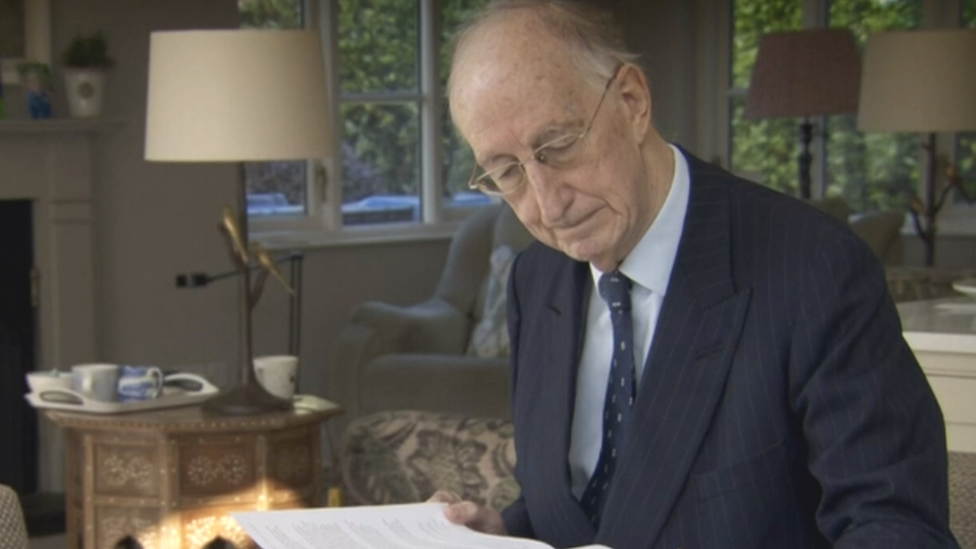Retired judge says sex education should be mandatory in primary schools
- Published

Sex education should be mandatory in Northern Ireland's primary schools, the retired judge who led reforms of rape trials has said.
Sir John Gillen conducted a major review into how the justice system handled sexual offence cases.
He said teaching all young children about consent would be key to preventing sex attacks.
The former lord justice of appeal was speaking in an interview for BBC NI's Spotlight programme.
He reinforced his support for the government imposing a curriculum on schools for children as young as five.
But his position remains at odds with the Department of Education, which is committed to issuing only guidance to schools, rather than specific instructions, on the teaching of relationship and sex education (RSE).
Children should be taught the 'concept of consent'
'Concepts of consent'
Sir John told Spotlight: "If society is going to change, if we're really serious about protecting women and girls and children, then we have to take steps to ensure that the public is properly educated."
He added: "I'm a firm believer that children as young as five and six should be introduced, at a child-friendly level, to the concepts of consent, to the concepts of responsibility in relations with the opposite or same sex, as the case may be."
According to police statistics, more than half the victims of sexual assault in recent years were children or teenagers.
Reports of sexual offences against children have doubled over the past decade in Northern Ireland.

David Tweed's family described years of physical and sexual abuse at the hands of a man they described as "a monster"
Sir John's wide-ranging interview was part of a broader Spotlight programme featuring the family of the late rugby star turned unionist politician David Tweed.
In their first televised interview as a family, Tweed's ex-wife Margaret and four of her five daughters described years of physical and sexual abuse at the hands of a man they described as "a monster".
Tweed, who died in a motorbike crash in October, was convicted in 2012 of a string of child sex abuse offences against his daughter Lorraine and stepdaughter Amanda Brown.
His convictions were quashed in 2016 after the Court of Appeal found that the jury at the original trial should not have heard about his history of domestic violence.
As victims of sexual abuse, Lorraine and Amanda waived their legal right to anonymity following Tweed's death, along with their three sisters Victoria, Catherine and Jamiee-Leigh.
Sir John spoke generally in the programme about problems within the justice system, particularly from the perspective of alleged victims.
His review came after the case of ex-Ulster rugby players Paddy Jackson and Stuart Olding, who were acquitted of rape charges at a high-profile trial in 2018.
It resulted in 250 recommendations for change, among which was a call to exclude members of the public from the courtroom in serious sexual offence cases.
This recommendation became part of Justice Minister Naomi Long's Justice (Sexual Offences and Trafficking Victims) Bill, which progressed through its final stage at the Northern Ireland Assembly last Tuesday.

Sir John Gillen says teaching all young children about consent would be key to preventing sex attacks.
However, other areas of the Gillen Review are yet to come to fruition - including the issue around relationships and sex education in schools.
The review urged the Department of Education to push for greater inclusion in the curriculum, and if that proved ineffective, it recommended legislating for mandatory sex education.
Sir John said children must be told at an early age they have a right not to have their hand held or to have someone put their arm around them.
"The right to say 'please stop that' at an early stage has to be introduced," he said.
"I would be a very strong advocate of a mandatory sex education system, so that the government impose a curriculum on the schools. And so there's a consistency in approach."
Sir John said he understood that that was not what the Department of Education was in favour of.
'Inconsistent and insufficient'
The Department of Education says RSE is currently mandatory, but each school is left to develop its own policy.
This means that what is actually taught to pupils is a matter for schools to decide based on their individual ethos.
Last year a panel of experts assembled by the Department for Communities criticised the current approach as "inconsistent and insufficient".
A Department of Education spokesperson told the BBC that officials were "preparing additional guidelines for schools setting out the importance of ensuring the issues highlighted by the Gillen Review, including serious sexual offences and consent, are appropriately covered within the curriculum".
The department has previously raised concerns that more rigid RSE requirements could lead to protests by parents.
Of Sir John Gillen's 250 recommendations, 30% have been completed, 22% are partially complete, and 37% are in train.
"There has been substantial progress," he told Spotlight.
"They are radical changes, and they're changes which I think will be, in many respects, game changers in the criminal justice system."
See Spotlight - Survivors' Voices on BBC iPlayer
Related topics
- Published24 November 2021

- Published23 November 2021

- Published19 November 2021

- Published29 October 2021
